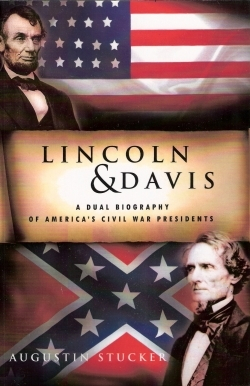Lincoln & Davis
A Dual Biography of America's Civil War Presidents
Abraham Lincoln once claimed his best friend was “the man who’ll get me a book I ain’t read,” writes Augustin Stucker in his thoroughly researched and lively “dual biography” of the sixteenth president of the United States and his war-time rival, Jefferson Davis, president of the Confederate States of America.
To write a fresh work on the most written-about president presents any author or scholar with a daunting task, yet Stucker has done so. Although graciously acknowledging that he has drawn from the works of authors of previous comparative biographies, notably those of Bruce and William Catton, Stucker crafts a new house from old bricks in Lincoln & Davis. He provides deep insights into the noble and flawed character of each of his subjects with a combination of poignancy and humor that makes his book a pleasure to read.
Stucker presses forward with the theory that, while Lincoln and Davis held almost diametrically opposed beliefs, they also had much in common, from their frontier roots to their personal tragedies. Stucker explores those commonalities, yet also points out how each took different lessons from their shared experiences. It is their different lessons, explains Stucker, that provide the keys to understanding how one man often derided as a mere backwoods “Gorilla” came to prevail over an aristocrat once held up as the very model of valor and accomplishment. Stucker has selected key incidents and anecdotes from the private and public lives of his subjects, from their youthful indiscretions through their harrowing days as war-time presidents. He uses these to explain how and why each took the path he did, and it is through these examples the author provides his readers with solid yet entertaining insights into their characters.
The work, however, does have its flaws. Stucker has an annoying, if thankfully infrequent, habit of changing voice to speak directly to the reader to give his personal opinion on an issue. He also seems unable to resist the temptation to throw in a comparison to modern events, or to add an odd quip such as how Lincoln, if he were alive today, could have found a career “as a stand-up comic.” Such asides are perfectly acceptable in an author’s prologue, but they are jarring when they appear in the body of the work, and they take away from an otherwise excellent and well-written book.
Despite its minor failings, Stucker’s work deserves a place on the shelf next to the books of the historians he cites as his sources and models for the book. Stucker has strong research skills, a proven ability to select key pieces of information from a mountain of data, and a solid and enjoyable style. Readers should hope that he continues to write, and that he takes a cue from Lincoln, whose “willingness to keep an open mind and learn from his mistakes,” writes Stucker, “kept him on the course to succeed.”
Reviewed by
Mark G. McLaughlin
Disclosure: This article is not an endorsement, but a review. The publisher of this book provided free copies of the book and paid a small fee to have their book reviewed by a professional reviewer. Foreword Reviews and Clarion Reviews make no guarantee that the publisher will receive a positive review. Foreword Magazine, Inc. is disclosing this in accordance with the Federal Trade Commission’s 16 CFR, Part 255.

